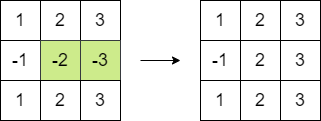Class Solution
java.lang.Object
g1901_2000.s1975_maximum_matrix_sum.Solution
1975 - Maximum Matrix Sum.
Medium
You are given an n x n integer matrix. You can do the following operation any number of times:
- Choose any two adjacent elements of
matrixand multiply each of them by-1.
Two elements are considered adjacent if and only if they share a border.
Your goal is to maximize the summation of the matrix’s elements. Return the maximum sum of the matrix’s elements using the operation mentioned above.
Example 1:

Input: matrix = [[1,-1],[-1,1]]
Output: 4
Explanation: We can follow the following steps to reach sum equals 4:
-
Multiply the 2 elements in the first row by -1.
-
Multiply the 2 elements in the first column by -1.
Example 2:

Input: matrix = [[1,2,3],[-1,-2,-3],[1,2,3]]
Output: 16
Explanation: We can follow the following step to reach sum equals 16: - Multiply the 2 last elements in the second row by -1.
Constraints:
n == matrix.length == matrix[i].length2 <= n <= 250-105 <= matrix[i][j] <= 105
-
Constructor Summary
Constructors -
Method Summary
-
Constructor Details
-
Solution
public Solution()
-
-
Method Details
-
maxMatrixSum
public long maxMatrixSum(int[][] matrix)
-